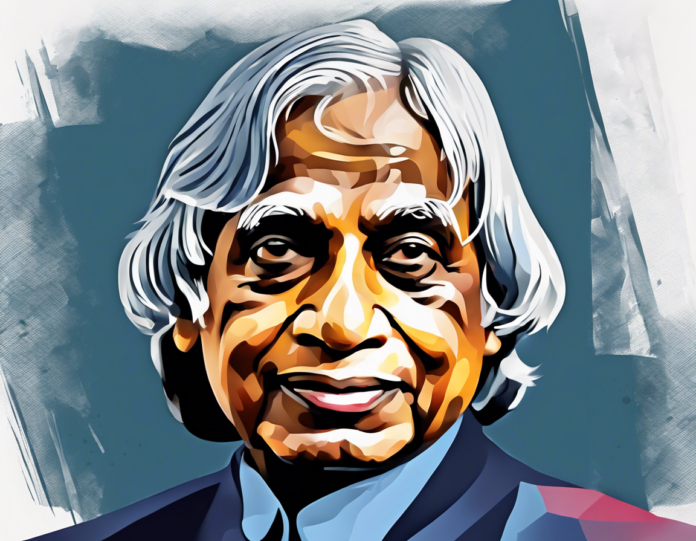Dr. Avul Pakir Jainulabdeen Abdul Kalam, widely known as A. P. J. Abdul Kalam, was a renowned Indian scientist and the 11th President of India. Born on October 15, 1931, in Rameswaram, Tamil Nadu, Dr. Kalam’s contributions to the fields of science, aeronautics, and politics have left an indelible mark on Indian society and beyond. His work in developing India’s missile technology and his vision for the country’s development made him a beloved figure both in his homeland and worldwide.
Early Life and Education
A. P. J. Abdul Kalam was born into a humble Tamil Muslim family in Rameswaram. Despite facing financial hardships during his childhood, Kalam was a bright and hardworking student. He graduated from Saint Joseph’s College, Tiruchirappalli, with a degree in physics and went on to study aerospace engineering at the Madras Institute of Technology.
Career in Science and Technology
Dr. Kalam’s career in science and technology was both distinguished and impactful. He played a pivotal role in India’s civilian space program and military missile development efforts, earning him the title of the “Missile Man of India”. His work on the development of ballistic missile and launch vehicle technology in India was instrumental in enhancing the country’s defense capabilities.
Presidency and Beyond
In 2002, A. P. J. Abdul Kalam was elected as the President of India, serving in the highest office from 2002 to 2007. During his tenure, he continued to focus on education, innovation, and societal development. Post his presidency, Kalam remained an active advocate for science education and youth empowerment, engaging in teaching, writing, and public speaking.
Awards and Legacy
Throughout his life, A. P. J. Abdul Kalam received numerous awards and honors for his contributions to science, technology, and public service. He was awarded the Bharat Ratna, India’s highest civilian award, in 1997. Kalam’s vision for a developed India, his humility, and his dedication to the welfare of society continue to inspire generations of Indians and people around the world.
The Visionary’s Philosophy
A. P. J. Abdul Kalam was known for his visionary thinking and his inspirational words. He believed in the power of education, hard work, and perseverance to bring about positive change in society. Some of his most famous quotes include:
- “Dream, Dream, Dream. Dreams transform into thoughts and thoughts result in action.”
- “If you want to shine like a sun, first burn like a sun.”
- “All of us do not have equal talent. But, all of us have an equal opportunity to develop our talents.”
Remembering A. P. J. Abdul Kalam
Even after his passing in 2015, A. P. J. Abdul Kalam’s legacy lives on. His life story continues to motivate millions of people to dream big, work hard, and contribute positively to society. From students to scientists, from politicians to professionals, Kalam’s life and teachings have left an indelible impact on people from all walks of life. As India and the world commemorate his birth anniversary on October 15th, let us remember the man who truly epitomized the heights that can be achieved through dedication, integrity, and vision.
Frequently Asked Questions (FAQs)
1. What was A. P. J. Abdul Kalam’s area of expertise?
A. P. J. Abdul Kalam was an aerospace engineer who specialized in missile technology and space research.
2. What is A. P. J. Abdul Kalam best known for?
Dr. Kalam is best known for his contributions to India’s missile technology program and for serving as the President of India from 2002 to 2007.
3. How did A. P. J. Abdul Kalam inspire youth?
A. P. J. Abdul Kalam inspired youth through his motivational speeches, writings, and personal example of dedication and humility.
4. What are some of A. P. J. Abdul Kalam’s famous quotes?
Some of A. P. J. Abdul Kalam’s famous quotes include “Dream, Dream, Dream”, “If you want to shine like a sun, first burn like a sun”, and “All of us do not have equal talent. But, all of us have an equal opportunity to develop our talents.”
5. How did A. P. J. Abdul Kalam contribute to India’s defense capabilities?
Dr. Kalam played a key role in the development of India’s ballistic missile and launch vehicle technology, which significantly enhanced the country’s defense capabilities.
6. What awards did A. P. J. Abdul Kalam receive during his lifetime?
Among the numerous awards A. P. J. Abdul Kalam received, the Bharat Ratna, India’s highest civilian award, in 1997 stands out as one of the most prestigious.
7. What was A. P. J. Abdul Kalam’s educational background?
A. P. J. Abdul Kalam studied physics and later pursued aerospace engineering, becoming a highly respected scientist and engineer.
8. How is A. P. J. Abdul Kalam remembered today?
A. P. J. Abdul Kalam is remembered as a role model for his dedication to education, his leadership in science and technology, and his unwavering commitment to societal progress.
9. What was A. P. J. Abdul Kalam’s role as the President of India?
As the President of India, A. P. J. Abdul Kalam continued to focus on education, innovation, and development, advocating for a stronger and more inclusive society.
10. How can individuals carry forward A. P. J. Abdul Kalam’s legacy?
People can honor A. P. J. Abdul Kalam’s legacy by embodying his values of hard work, integrity, and service to society, and by working towards the betterment of their communities.

